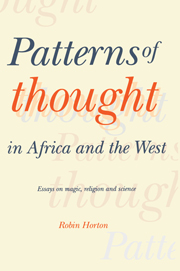1 - A definition of religion, and its uses
Published online by Cambridge University Press: 05 June 2012
Summary
In recent British anthropology three principal types of working definition have been used in approaching the comparative study of religion. The first treats the term ‘religion’ as lending itself with difficulty to further definition and as covering an area of human activity which lacks sharply delineated boundaries; where such a point of view prevails, the reader is simply asked to accept as ‘religious’ any phenomena which the author happens to select for treatment under this heading. The second type treats ‘religion’ as referring to a class of metaphorical statements and actions obliquely denoting social relationships and claims to social status. The third type treats the term as referring to commerce with a specific class of objects, i.e. ‘religion is the belief in spirits’ or ‘religion is the belief in the supernatural’. As they stand, I believe all of these approaches are unsatisfactory, and in this paper I shall follow up their criticism with the proposal of an alternative definition. Definitions being mere tools towards the discovery of empirical regularities, I shall of course try to show that the alternative proposed is of value in terms of the hypotheses and questions it suggests about the determinants of religious forms.
The approach which would press on with the scope of the term ‘religion’ left undefined has had some worthy advocates – among them, Professor Nadel, author of one of the most comprehensive analyses of an Mrican religious system produced to date.
- Type
- Chapter
- Information
- Patterns of Thought in Africa and the WestEssays on Magic, Religion and Science, pp. 19 - 50Publisher: Cambridge University PressPrint publication year: 1993
- 2
- Cited by



